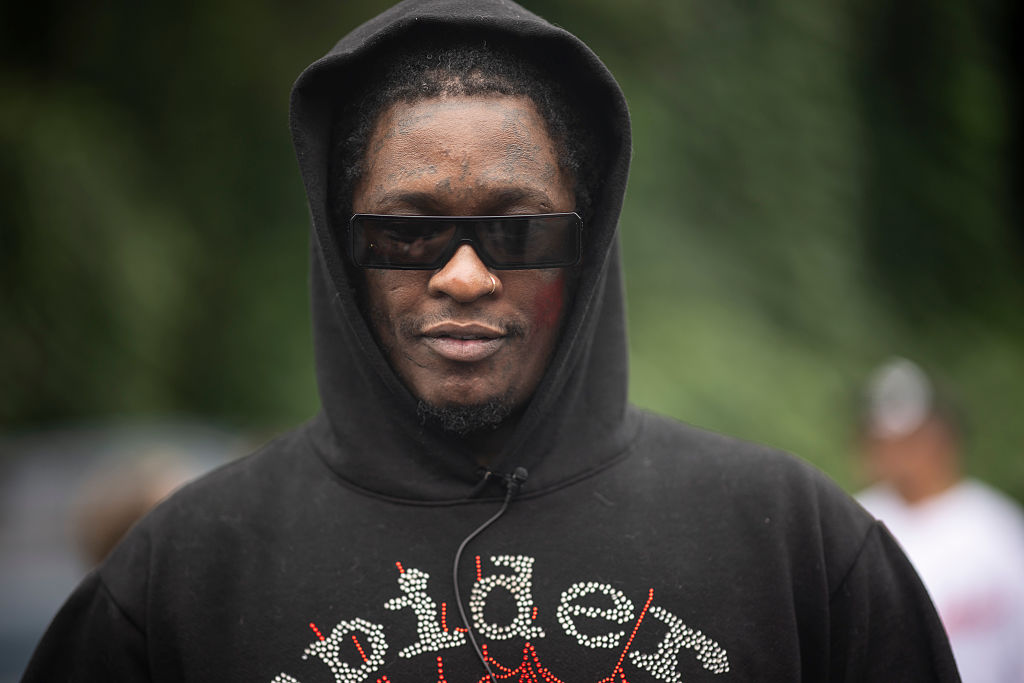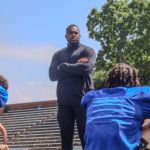Why Young Thug’s Anti-Therapy Stance Matters Beyond Rap

Since entering the game, Young Thug has been one of the most enigmatic figures in Hip-Hop. He’s, by all admissions, a gangsta, who will openly wear skirts and painted nails. Thug has been one of the few celebrated Black men who can float in and out of masculine tropes like a speedskater. He’s shown his vulnerability on the opening track of his 2021 album Punk (which, could be dubiously seen as a nod to the musical genre, or the common refrain for flamboyant Black men) “Die Slow” in which he speaks about his brother avoiding a life sentence and his mother finding out that his father was cheating on her only to almost lose her life after his father’s new woman hit her with his car.
The larger point is for all of the good work Young Thug has done trying to undo the rigid guardrails of manliness; for all his high-pitched singing; all of the skirts; all of his defiance of societal norms, the Atlanta rapper does a disservice to the Black community when he goes back into his archaic bag to express not only hesitation but resistance to therapy, which raises larger questions about culture, personal history, and the music industry’s attitudes toward mental health.
During a Sept. 27 appearance on The Pivot podcast, Thug, born Jeffery Lamar Williams, noted that he doesn’t believe in therapy and added that he’d feel “less of a man” if his partner were to go to a therapist.
“My big sister, my big brother, my dad, my mom, my OGs… I listen to y’all,” he said. “It’s like damn, you’ll actually call somebody and listen to what they have to say over me? Instead of listen to what I’m telling you,” he said.
In case there was any confusion about his stance on therapy, Thug tweeted out later that same day:
Thug is not alone in his ambivalence towards therapy; ever since couches were created and therapists sat across from them, Black people have come up with reasons not to participate in mental health care. For years, I remember Black men in my family constantly stating: “White people go to therapy, Black people deal with it.”
There’s always been some deep-seated connection between discussing feelings and femininity that has stopped many Black men from seeking help. What Thug stated and then tweeted isn’t just a window in the complex relationship between Hip-Hop, Black masculinity and therapy; it’s dangerous and could potentially keep those who need help from seeking it.
Which is odd considering that in 2016, Young Thug wore a dress on the cover of Jeffrey. Not that clothing equates to open-mindedness, but one would assume that a man confident enough to sport a dress wouldn’t draw the feminine line at seeking mental health help, but that person would be wrong.
Especially when you consider that Young Thug’s brand is built on challenging heteronormative roles through resilience and strength. And in the Black community, where solo survival can project a kind of invincibility, therapy requires submission, and that can feel like weakness. For Thug, and those who believe like him, going to therapy is an admission that they aren’t strong enough to make it on their own, which can feel like a contradiction when your persona is built on solitary perseverance.
And you can’t separate Thug’s reluctance to believe therapists can help unsort larger mental health dilemmas from the cultural context of Hip-Hop and its foundational pillars of toughness, survival, and resilience in the face of oppressive obstacles. It’s not as if artists haven’t been vulnerable; in fact, Kid Cudi, Kanye West, and G Herbo have openly talked about therapy.
“I didn’t really think [therapy] was something that I needed or something that was for me, because where I come from, the things that we go through and the things that we experience, we sort of normalize,” G Herbo tells GRAMMY.com. “So we don’t think that we’re crazy. We don’t think that we’re suffering from mental illness because we’re paranoid for our life, because everyone around us is paranoid for their life. So we don’t feel like the oddball, and I think that needs to change.”
And G. Herbo’s right. It’s time to outgrow the stigma around Black male emotions that only seem to allow for aggression, humor, or stoicism. It’s time to heal past traumas so that the experiences of the mythologized ghetto upbringing don’t continue to serve as a synonym for real. Therapy doesn’t just break these stereotypes down; it forces those vulnerable enough to sit through a session to realize that they didn’t have a choice; the experiences they faced were heaped on them, and their survival was conditioned to their ability to adapt. Therapy is actually one of the first independent admissions of an actualized adult life and I know because I’m in therapy. Every week. To attempt to undo the unhealed traumas so that I don’t pass that on to my children.
That’s being a man. Not fighting until your knuckles are bloody, or drinking more than everyone around you, or sleeping with more women than anyone else you know; all myths that I once believed were gospel. Being a man, a true man is walking into that therapy office, taking a seat, and allowing the therapist to assist you in examining those parts of you that you aren’t comfortable talking about, and becoming fully healed, and what could be more manly than that?








